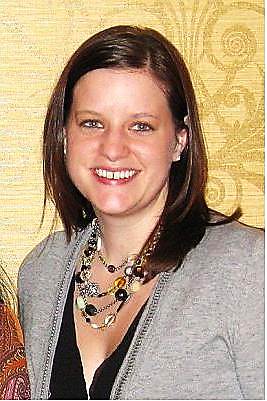
Name Lindsey Roberts McKenzie
- Education M.E. Engineering Management, University of Colorado at Boulder; B.S. Civil Engineering, North Dakota State University
- Target Audience High School

Sometimes you have to swap your umbrella for a raft! On average, 80 people in the US die each year due to flooding caused by heavy rainfall or dam failure. Lindsey Roberts McKenzie, and other Water Resource Engineers around the country work to keep us safe from flooding through floodplain management and dam engineering. Read on to learn why water resource engineering may be the perfect the career for you!
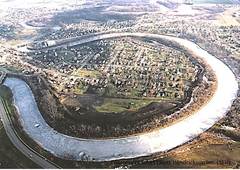 I work as a project and water resources engineer in our Heavy Civil Department. A majority of the projects that I work on relate to flood control and flood plain management. I have also worked on projects to help mitigate invasive species in Minnesota lakes.
I work as a project and water resources engineer in our Heavy Civil Department. A majority of the projects that I work on relate to flood control and flood plain management. I have also worked on projects to help mitigate invasive species in Minnesota lakes.
I initially wanted a career in architecture, but decided that I was lacking the creative piece that architects need. There's a joke that architects make buildings pretty, but engineers help them stand up. So, before entering my first year of college I decided that I was better suited for a career in civil engineering. I felt that civil engineering was a natural step away from architecture.
When I wear my project engineer hat, my main role is to act as a line of communication and leadership between the technical design team and the project manager. My job is to support the project manager, as well as bring all of the parts of the design from each technical team together into one complete design package. When I wear my water resources engineer hat, some of my tasks include hydrologic and hydraulic modeling, floodplain mapping and analysis, and the design of storm water management features as part of permanent flood control systems.
A typical day can include project construction site visits, design meetings with technical team members, progress meetings with clients and design time on my own. I am also fortunate to have a company who supports my efforts with the Society of Women Engineers (SWE) and my current status as a graduate student, so I also spend some time during the day working on items as part of my SWE job and my course work.
I really enjoy seeing projects from start to finish. It's also quite satisfying knowing that the projects I work on help protect people and their property, as well as help make their lives a bit easier. Making life easier for everyone is the goal of every engineer.
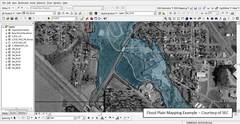 When you were a kid, did you like science, engineering and/or math?
When you were a kid, did you like science, engineering and/or math?I liked both science and math. I really enjoyed science because it allowed me to problem solve and work with my hands. All of my science teachers used a lot of hands on activities, which made class fun and engaging.
There wasn't really one defining moment in my life that led to engineering. I think my thoughts of becoming an engineer/scientist started when I was fairly young and evolved throughout my younger years. I really liked building and making things. I loved Legos and did a lot of word and number puzzles, as well as the typical kinds of puzzles. I was also active in 4H, where I learned things like cooking, canning, baking and sewing. Though the activities I did in 4H don't really associate with engineering, they all have math and science components to them. I was also heavily involved in sports, so I knew I wanted to work in a team atmosphere that had challenges.
I think just getting started in the civil engineering program at North Dakota State University was my biggest challenge. I found that the program was much more difficult than anything I had encountered in high school. My courses in college required an entirely different level of preparation for class. I feel like I spent my whole freshman year of college studying.
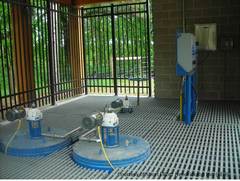 your field?
your field? I think it was a combination of people. My uncle, Randy, is also a civil engineer, so he enlightened me on what a civil engineer does as a professional and what I could do as a career with a civil engineering degree. My parents, noticing my interests as a child and teenager, encouraged me to seek a career in a science or math field. There are many people in my family who have science based careers - my dad is an agronomist, my mom is a nurse, my sister is a nurse, my step-dad designs fire trucks and my step-mom is a teacher. My grandmother had a nursing degree and my grandfather had an engineering degree as well. Also, I have many aunts, uncles and cousins with science/math based degrees.
If you want to go into water resource or dam engineering, a bachelor of science in civil engineering is a great choice. As for competitive schools, I think any school offering this program is going to be a good choice because I feel that engineering in general is competitive and challenging. Most programs, no matter what school, will reflect this. The biggest difference between schools will be the methods and means in which the programs are taught - theoretical or real-world applications. My school taught a good mix of both theory and practice.
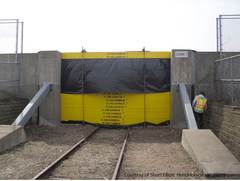 Do you have any suggestions for how students in high school can gain real-world experience in your field?
Do you have any suggestions for how students in high school can gain real-world experience in your field? Definitely take advantage of office visits and job shadows. Some companies might even offer you an internship, which would be great experience and, if they pay you, a great summer job.
The world's infrastructure is always going to be of major concern as the population grows and concerns on how to protect Mother Nature continue to arise. Civil engineers are going to be responsible for not only designing the necessary systems, but also the means and methods in which they function and are constructed. With such rapid growth and strict regulations, civil engineers will need to learn how to make systems to support more people. We're going to need to do a lot more with less. The systems will need to last longer and be constructed in less time all for less money.
(adapted from noaa.gov, weather.com)
Agronomist - deals with the cultivation of land, soil management, and crop production
Flood - a great flowing or overflowing of water, especially over land not usually submerged
Flood plain - a nearly flat plain along the course of a stream or river that is naturally subject to flooding
Hydraulic - operated by, moved by, or employing water or other liquids in motion
Hydrologic - distribution, conservation or use of the water of the earth and its atmosphere, particularly at the land surface
Invasive Species - non-native (or alien) to the ecosystem under consideration and whose introduction causes or is likely to cause economic or environmental harm or harm to human health.
4H - an organization sponsored by the U.S. Department of Agriculture, established chiefly to instruct young people, originally in rural areas, in modern farming methods and other useful skills, as carpentry and home economics.
(adapted from dictionary.com)
Sometimes you have to swap your umbrella for a raft! On average, 80 pe…